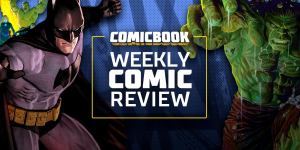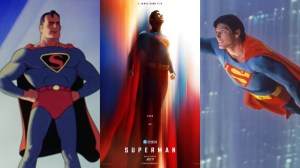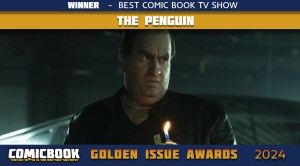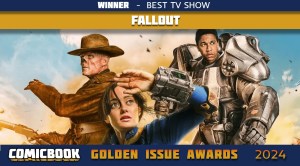
When Marvel or DC comics aren’t available to use in television or film, many writers often create “fake” comic books that either parody or homage their favorite genres in comics. For example, Turbo Kid, the new retro/post-apocalyptic film debuting this weekend. It features a boy inspired by his favorite comic (from which the movie takes its title) to build a suit of retro battle armor and save his best friend from an evil warlord.
Videos by ComicBook.com
While fictional comics like Turbo Kid don’t exist in the real world, they often inspire and play a major role in the stories in which they appear. Here’s a look at five great “fake” comics that have popped up in some of our favorite pieces of pop culture–including comic books themselves.
Radioactive Man
A pastiche of both Superman and Batman, Radioactive Man is the most popular superhero in the world of The Simpsons. Gaining vague superpowers by surviving a nuclear explosion, Radioactive Man fought crime alongside his sidekick Fallout Boy, who had x-ray vision. Bart and several of his friends are avid collectors of Radioactive Man comics, and Springfield was even the site of a failed Radioactive Man film, which co-starred Bart’s best friend Milhouse as Fallout Boy. Bongo Comics, the publisher of The Simpsons comic adventures, have published several real Radioactive Man comics, which parody different eras of comics ranging from the classic Silver Age to the grittier comics of the modern era.
Science Dog
Science Dog is a fictional comic starring an anthropomorphic dog adventurer, who also happens to be the smartest creature on Earth. Science Dog comics appear in the worlds of both The Walking Dead and Invincible. Carl often wore a t-shirt with Science Dog’s distinctive logo during early seasons of The Walking Dead television show. Walking Dead and Invincible writer Robert Kirkman also uses Invincible‘s lead character Mark Grayson’s love of Science Dog comics to make scathing points about the superhero comic industry. Kirkman and Invincible co-creator Cory Walker also publish short Science Dog comics in the back of every 25th issue of Invincible, featuring Science Dog fighting weird scientific threats while flying with a jetpack.
Tales of the Black Freighter
The famed “comic within a comic,” Tales of the Black Freighter was a fictional pulp comic that appeared in Alan Moore and Dave Gibbons’ Watchmen. A pirate themed pulp comic, Tales of the Black Freighter was Moore’s and Gibbons’ replacement for superhero comics (which Moore felt would be redundant in a world actually occupied by superheroes) and as a way to provide subtle commentary about the plot and themes of the main story. The self-destructive journey of the marooned sailor who appeared in Tales of the Black Freighter paralleled the journeys of several of the characters in Watchmen, particularly Ozymandias. It’s fitting then, that in the final chapter of Watchmen, Ozymandias mentioned that he’s had nightmares featuring the Black Freighter, a ship that houses the souls of the damned.
Ultra Comics
DC’s recent Multiversity event, written by Grant Morrision, featured a number of parallel universes all plagued by the Gentry, a group of evil “bad ideas” given form and flesh. The Gentry use a haunted comic book named Ultra Comics #1 to attack all realities at once, using the comic to infect the mind of anyone who reads it. As part of the Multiversity event, DC published Ultra Comics #1 as the eighth chapter of the event. There, it was revealed that “Ultra Comics” was a sentient fictional idea created to battle the Gentry on a fictional scale. Existing only in the pages of Ultra Comics (the comic book), “Ultra Comics” (the idea) used the ideas and thoughts of its readers to battle the Gentry inside the pages of the comic book. While “Ultra Comics” loses its battle against the Gentry, it does manage to capture the evil ideas inside the pages of the comic…thus turning it into the haunted comic used by the Gentry to attack the multiverse. Sound confusing? That’s a Grant Morrison comic for you.
9th Wonders!
The soon-to-return TV series Heroes featured a self-published comic called 9th Wonders! illustrated by the precognizant character Isaac Mendez. While most of the stories in 9th Wonders featured early Silver Age monster stories, later issues featured the adventures of several of the other characters from the show, written and drawn by Mendez before the events occurred in real life. Hiro, an avid comic book fan, used 9th Wonders to convince his friend Ando that his powers were real and to guide him on his heroic quest. Tim Sale, a real life comic book artist (Spider-Man: Blue, Batman: The Long Halloween), illustrated all the pages of 9th Wonders! along with all the other artwork created by Mendez on the show.










